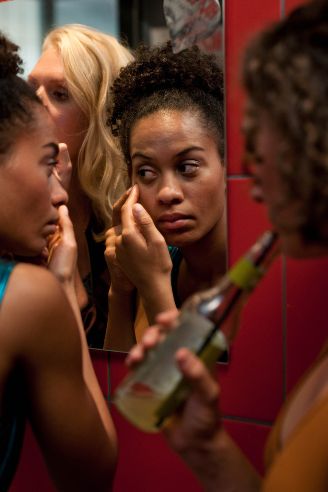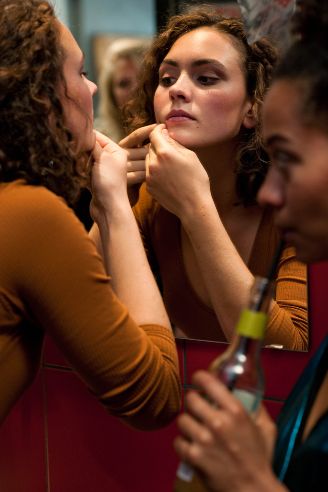Selfie, selfie on the wall, who’s the fairest of them all? Teens in particular use social networks as a reflection of themselves, to test out roles and find their own identity. Yet it is precisely during puberty that pimples and blackheads start appearing in droves on the skin.
Petra Stemplinger, a psychiatrist for children and adolescents in Germany, has advice on how how to manage this time of change between 12 and 18 years of age – pimples and all – and how to foster a sense of self-confidence.
Yesterday’s skin was super smooth; today it’s covered in pimples. Why must puberty be so annoying?
Petra Stemplinger (PS): Pimples are annoying, but somehow also endearing! They show that something amazing is going on inside a young person on the path to adulthood. Unfortunately, it’s no fun when they happen to you and you don’t know what’s going on. Young people push their way into adolescence. They’re finding their own way, yet still don’t know where the journey will take them. Everything is still unclear – and that seems to be written all over their faces. The flawless skin of their childhood no longer suits them, yet new, clear skin is not yet in sight.What’s going on in the body and soul during puberty?
PS: The whole body is undergoing a transformation as it moves on to a new level: adulthood. And hormones are the mediators of this change. You get more hair on your body, your sweat has a stronger odour, if you’re a girl your breasts grow, and the skin generally gets larger pores, with pimples and blackheads appearing on the forehead, nose, and chin. It’s unsettling to experience these changes in yourself. Small things call our attention to the fact that we are no longer like we used to be; some people might even start to fear their own bodies. The faster this all happens, the stronger the emotional impact. After all, puberty also signals the end of childhood.What kinds of feelings might arise when you no longer feel comfortable in your own skin?
PS: There is a whole range of feelings, from uncertainty to self-depreciation. You don’t know your new self overnight; you must gradually get to know your new body. At the same time, our desire to be attractive becomes stronger than ever. You might feel ashamed, frustrated, angry or afraid that you’ll look like this forever. So some teens withdraw into themselves; they feel in need of protection but don’t know how to express it. Others rebel against everything and everyone, frustrated by their own imperfection. The skin, with its small volcanoes across the face, shows that you might explode – and sometimes you do.Many young people suffer immensely because others can see that they are in the midst of puberty. Because this is also a time when they want to be cool.
PS: It’s natural for teens to want to look like they’re ready for the world, to be seen as one of the grown-ups and treated with respect. But everyone can see that you’re still unfinished. Your voice cracks, you have oily skin and this makes you insecure. No wonder you feel like a failure, or want to hide, or are more prone to angry outbursts.


What practical advice do you have for dealing with pimples during puberty?
PS: A concealer stick can work wonders. During the day, it can cover up impurities so that no one sees how things are going at the moment. At home at night, you can take off your “mask” and gently cleanse and care for your skin – and give it a chance to recover during this sensitive phase. By taking care of themselves in this way, teens with blemished skin can learn to love their bodies. This strengthens self-acceptance and fosters a can-do attitude.What is the role of friendship during puberty?
PS: Friendship is of central importance. Teens outgrow their family, which is like a skin that has become too tight. They seek contact with like-minded peers who understand them and who they don’t need to hide anything from. I know from my work that young people clearly distinguish between Facebook friends who “like” you and true friends who genuinely like you. These are the friends with whom they can share their vulnerabilities, insecurities, and fears. Inner values such as honesty and trust grow through friendships and become more important than outer appearances and pimples.Selfies have become more important than ever as a way of being seen and admired. How can a young person become less dependent on them?
PS: The more secure you feel with your friends, the easier it is to get over the fact that you have pimples or that someone in a social network has criticised your personal style. Selfies among friends are an expression of the fun they have together. It’s not about having a superficial, standard face, like in television shows where an individual is considered a failure because of how they look or walk. Friends love the idiosyncrasies, the uniqueness, the ideas and the humour of you. With friends, you don’t have to constantly compare yourselves, and you know that you are more than the sum of your selfies.


It is said that puberty is when parents become “weird”. How can they support their children instead?
PS: According to Anthroposophical understanding, puberty is the time when the soul fully enters the material realm and is ready to tap its potential and make a difference in the world, to change it into something better and more beautiful. Parents should be attentive to what young people long for, not their flaws or shortcomings, but rather the goodwill behind it. They should try and recognize who their children want to become. And remember how it was for themselves during those tumultuous times. Parents should give their children space and time to discover who they are and what path they wish to take in life.What are your tips for parents of teens?
PS: Try to stay relaxed and don’t take emotional outbursts personally. But the time before that, childhood, is very important as well. Childhood should be a time of rituals such as communal meals when healthy communication is fostered within the family. Especially in the evening, at bedtime. These days, taking time for one another is the best protection against being pulled in by the media. “Dad time” works miracles for boys as well as for girls. It’s wonderful when a father can relate his own experiences and admit that he also felt bad as a child or tell how he coped when he was afraid. This might help a child to understand, “Wow, even my dad used to be afraid. But now he’s a hero. If he can do it, I can do it.”13 tips for teens & parents during pimply times:
- Only superheroes can be strong and cool all of the time. For everyone else: Have a positive approach to everyone’s mistakes and shortcomings in the family.
- Mothers and fathers should be authentic. This strengthens bonds of trust and fosters healthy authority.
- Everyone has to accept that the body is now in a state of upheaval and that it shows.
- A good concealer and gentle natural cosmetics can help get through the day.
- Treat your body lovingly, like a good friend.
- Don’t make fun of people because of their looks. It’s natural that some people have more pimples than others. Ask yourself how you would like to be treated, and treat others accordingly.
- Have a “pimple party” where good friends get together to pamper their skin. Lighten up and laugh about how your face looks like a volcanic landscape. Together it’s easier.
- Make yourself “mysterious” by limiting your visibility on social networks. What does it feel like when you take a break from social media? Talk about it with people you trust.
- Discover and cultivate your own strengths – try a new hobby.
- Take time to ask yourself questions like: Who am I, what do I want to contribute to the world? And talk to your peers about it.
- Young people are especially vulnerable during puberty, so parents should listen with their heart instead of judging and criticising.
- Establish places where each person in the family can retreat into their own space.
- Be accepting of emotional ups and downs. If this phase is particularly intensive, try putting up an “emotional umbrella” – and trust that the phase will pass.
 Petra Stemplinger
Petra StemplingerPsychiatrist & psychotherapist for children and adolescents
Petra Stemplinger heads the MVZ medical care centre at the children’s clinic in Landshut, Germany. Where she works with children of all ages, providing both inpatient and outpatient care. Addressing topics on puberty and self-confidence are part of her everyday work. She regularly coaches teens and parents through this turbulent time.

